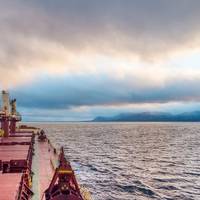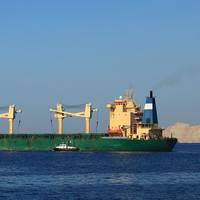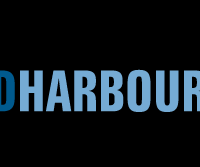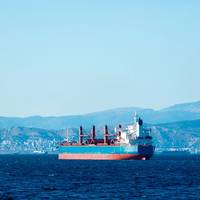Greek Owners Top Global Cargo Carrying Capacity

BIMCO’s Chief Shipping Analyst, Niels Rasmussen, has revealed that Greek and Chinese shipping companies now own 34% of the global fleet’s cargo capacity, with Greek owners leading on cargo capacity.“The global fleet of cargo carrying ships consists of around 61,000 ships with a deadweight capacity of about 2,200 million tonnes. The ships owned by Greek and Chinese shipping companies contribute 34% of the total fleet’s deadweight tonne capacity,” says Rasmussen.Although consolidation has been significant within the container shipping segment…
Greek Fleet Maintains Pole Position -Clarksons

Greek shipowners retain their preeminent market position with 16.4% of global GT (19% by dwt) despite recent years of crisis, operational challenges, dramatic market change and widespread disruption, according to recent analysis from Clarksons Research.Over the last four years, Greek shipping companies have added 29 million GT to reach 247 million GT / 41 million dwt on the water), the U.K.-based data and analytics firm said.A long term focus on tankers (26% global fleet share…
Offshore Boosts Optimarin Growth
Ballast water treatment (BWT) specialist Optimarin said that the recovery of the offshore shipping segment is playing a key role in driving its revenues to new heights.The Stavanger, Norway-based business, which has focused exclusively on BWT for the last 25 years, has just signed a number of fleet agreements, including a contract with Island Offshore for 19 systems, doubling its order intake year on year.“Optimarin has long held the position of the preferred supplier to the offshore segment, so the fact that the industry is recovering – with fewer vessels laid up – is a very positive development for us,” comments Tore Andersen, EVP Sales…
Two Bangladeshi Workers Killed in Shipbreaking Yard
Two Bangladeshi workers were killed Monday in a fire that started in the engine room of an end-of-life tanker being dismantled at a shipbreaking yard in Chittagong, Bangladesh, the NGO Shipbreaking PlatformMd Jamil, 23 years old cutter man, and Bipul lost their lives while scrapping the ship GREEK WARRIOR (IMO 9191412) at Shagorika Ship Breaking Yard. According to local media, Jamil was burned and rushed to Chittagong Medical College Hospital. He died before reaching the hospital. The body of Bipul was discovered on board only few hours later.Shagorika yard and RA Shipbreaking yard, which has been recently under the spotlight for the purchase of Nordic America Tankers’ NORDIC SPRITE…
UAE, Greece, USA: Worst Vessel Dumpers
The United Arab Emirates (UAE), Greece and the United States of America (USA) top the list of country dumpers of ocean-going commercial vessels in 2018, according to new data released today by the NGO Shipbreaking Platform.UAE owners were responsible for the highest absolute number of ships sold to South Asian shipbreaking yards in 2018: there were 61 ships in total.Greek owners, beached 57 vessels out of a total of 66 sold for demolition. American owners closely followed with 53 end-of-life vessels broken up on South Asian tidal mudflats.The ‘worst corporate dumper’ prize goes to the South Korean liner Sinokor Merchant Marine, said NGO Shipbreaking Platform.
NGO Shipbreaking Platform Slams Gadani Yards
A tanker caught fire at the Gadani shipbreaking beach that holds a deplorable record of life threatening accidents on 11 October.Fortunately, no casualties were recorded. Only a few days later, on 14 October, yet another oil tanker named KRITI (IMO 9270737) caught fire, this time injuring seven workers, three of which are in a critical condition.The Platform has reported a series of accidents following the catastrophic explosion that killed at least 29 workers and injured 58 on the 1st of November 2016. Since then, there have been at least five more fires caused by unsafe cutting operations. Difficult access for firefighters, a severe lack of ambulances and no hospital in the close vicinity of the yards aggravate the conditions…
Ballast Water Testing: B-QUA Test Kit

Maritech Ltd. signed a sales and distribution agreement with French water microbiology company aqua-tools to meet “significant interest” in onboard ballast water testing from Greek shipowners.The agreement, which covers the training and supply of aqua-tools’ B-QUA test kit, was inked during the Posidonia 2018 event, in early June.“Greek shipowners are looking at the use of indicative-based monitoring as a means of assessing the efficiency of their ships’ ballast water treatment systems…
Inmarsat Offers Unique Maritime IoT Insights
Original research commissioned by Inmarsat suggests that the maritime industry is more amenable to adopting analytic, management and operational tools applied through the Internet of Things (IoT) than many commentators have supposed. The release of ‘Industrial IoT: Maritime’ coincides with Posidonia 2018 and is part of the Inmarsat Research Programme 2018, which provides a cross-sectoral study on digitalisation in the global supply chain and is due for publication on June 26th. The full report, which is based on 750 interviews conducted by technology market research company Vanson Bourne, investigates use of, attitudes to and predictions for IoT-based solutions across the maritime, transport and logistics, energy, mining and agriculture sectors.
Coldharbour Targets Greek Market

“Posidonia could not have come at a better time for us,” said Andrew Marshall, Coldharbour Marine Chief Executive, a few days before Posidonia opened its doors to the global shipping community in Athens. “We are in the final stages of a successful ballast water treatment installation for one of our key Greek clients, and we are in negotiations with several other potential customers in this important market. The ballast water treatment sector is picking up at last.”“Greek shipowners are important to us…
Germany and Greece: Worst Vessel Dumpers
As in 2016, Germany and Greece top the list of country dumpers in 2017, according to new data released today by the NGO Shipbreaking Platform. German owners, including banks and ship funds, beached 50 vessels out of a total of 53 sold for demolition. Greek owners were responsible for the highest absolute number of ships sold to South Asian shipbreaking yards in 2017: 51 ships in total. Since the Platform’s first compilation of data in 2009, Greek shipping companies have unceasingly topped the list of owners that opt for dirty and dangerous shipbreaking. Despite increased pressure for safe and clean ship recycling from Norwegian investors and authorities, in 2017, the number of Norwegian-owned ships scrapped on the beach was on the rise: 18 ended up in Alang, Gadani and Chittagong.
Liberian Registry No 1 Choice for Greek Shipping
Liberia has confirmed its position as the leading flag of choice for Greek ship owners and operators, according to statistics produced by the independent research and information organisation Marine Information Services (MIS) in Greece. The MIS figures show that the Greek merchant fleet now includes 1,037 Liberian-flag ships. Liberia also leads the way in terms of total deadweight tonnage registered under its flag by Greek owners, aggregating 78m dwt. Michalis Pantazopoulos, Senior Vice-President of the Liberian International Ship & Corporate Registry in Greece, says, “The MIS figures measure fleet size in numbers of ships and total deadweight tonnage, which are the parameters used by the International Maritime Organization and widely recognised throughout the industry.
Marshall Islands Registry is "Number Two"
The Republic of the Marshall Islands (RMI) fleet now stands at 223,262,177 deadweight tons (DWT), making it the second largest registry in the world in terms of DWT. International Registries, Inc. and its affiliates (IRI) have provided administrative and technical support to the RMI Registry since 1990. "This is a very significant milestone for the RMI Registry," said Bill Gallagher, President, IRI. "A strong legislative framework, customer driven service ethos, and a commitment to quality have all been key to our continued success," he continued. The RMI is not only the world's second largest registry, but the Greek shipping industry's leading flag as well.
Top 10 Ship Owning Nations

Kicking off the New Year, VesselsValue has put together a list of the top 10 ship owning nations by fleet value in 2017. Despite suffering the biggest total drop in total feet value, Greek owners held onto their spot at the top with a $84.079 billion fleet, reflecting a decrease of nearly 12 percent in the cargo sectors. Greece also held onto its lead in the bulk carrier and tanker categories. “Greek tanker owners started 2016 earning more than $100,000/day on their vessels. However, the rest of the year has been predominantly bearish.
Bulk Carrier Secondhand Sales Booming
The festive season is here, so shoppers are out and looking to buy. However, when it comes to the bulk carrier sale and purchase market, business has been booming throughout 2016, says Clarkson Research Services. The depressed earnings environment and limited availability of finance have seen increased ‘distressed’ sales, while some investors have been hoping to pick up a bargain. Let us take a look at this ship shopping spree. A total of 567 bulkers of a combined 40m dwt were sold secondhand in January to November 2016, equivalent to 5% of bulker fleet capacity at the start of 2016. In terms of tonnage, sales were up 15% on full year 2015 and slightly above the previous annual record in 2007.
European Owners Lead in Buying Up Secondhand Tonnage
With European owners leading the pack in buying up vessels, the sale and purchase market appears to have been notably active in recent years, reveals Clarkson Research Services Limited. While Europe has been the main buyer region, the picture between owner countries in each region remains mixed. Greek owners have been the key European buyers, while Chinese and Japanese owners have taken very different approaches to S&P activity. The sale and purchase market has seen firm activity since the start of 2014, with 3,313 vessels of a combined 117.7m GT reported sold during this time. This compares to a total of 97.8m GT reported sold in the period 2011-2013.
LNG: Did the Greeks Get it Wrong?
In December 2013, Alibra’s market report front page read: “When in shipping, do as the Greeks do.” At that time, Alibra was referring to the fact that 31% of the LNG carrier orderbook had been ordered by Greek owners. Billions of dollars in CAPEX were being pumped into natural gas exploration, as well as building infrastructure such as liquefaction and export terminals, especially in the US. Some 180 LNG carriers were ordered between January 2011 to December 2014 – many of them speculatively. Of these vessels, 52 were ordered by Greek companies (29%). But the Greeks didn’t get the LNG play wrong as such – no one could ever have anticipated the shock drop in oil prices seen in mid-2014…
239 End-of-life Ships Sold for Breaking in 1Q
According to the NGO Shipbreaking Platform 239 end-of-life ships were sold for breaking in the first quarter of 2016. Seventy-nine per cent of end-of-life ships ended up on South Asian beaches, making this quarter one of the worst ones in the last years for non-beaching yards around the world. Out of 189 vessels that reached the shores of India, Pakistan and Bangladesh, 127 were bulk carriers. As opposed to 2015 trends, India has again become the favorite final destination. 68 ships sold to South Asia in the first quarter of 2016 were owned by EU owners. Greek owners topped the list with 40 ships sold to South Asian breakers. German owners followed with 16 ships.
Chinese, Greek Ship Owners Accounted for 40% of Global Recycling
According to Clarkson Research Services, the record pace of fleet growth over the last decade and weakening global demand outlook has left many of the major shipping segments facing severe oversupply. Demolition of older ships is one way of easing overcapacity and recycling volumes have been strong in recent years. The top ten owner countries typically account for the majority of recycling with Chinese and Greek owners leading the way. Last year a total of 860 ships of a combined 23m GT were reported sold for demolition. This is equivalent to 2% of the start year fleet. During the shipping market boom demolition activity was limited as owners capitalised on the strong earnings environment.
Shipbreaking Practices in 2015 Reveal Appalling Record -Report
Ignoring industry leaders and human rights and environmental organizations, ship owners continue to profit from dangerous and dirty shipbreaking practices on South Asian beaches in 2015, according to new data released today by the NGO Shipbreaking Platform. Of the 768 large oceangoing vessels sold to the scrap yards last year, 469 were broken on the beaches of India, Pakistan and Bangladesh where shipbreaking yards often do not provide fundamental labor rights, ignore international waste trade law and fail to respect international environmental protection standards. One of many accidents that killed or maimed shipbreaking workers last year was a major gas explosion at Shitol Enterprise, a shipbreaking yard in Bangladesh.
Tide Turns in Favor of Greece’s Shipping Industry
An article in WSJ highlighted the Greek shipping industry, which it says has "emerged largely unscathed" from the nation's recent financial troubles. The reports say that shipping companies in Greece are buying vessels from cash-strapped competitors and German banks, and are poised to grab even more market share - but bailout-related tax hikes could lead shipowners to seek cheaper waters. Greek owners, who operate almost a fifth of the global fleet of merchant ships, are paying rock-bottom prices for competitors’ vessels. Shipping employs more than 200,000 people in Greece and contributes around 7.5% of Greece’s gross domestic product.
Impact of Financial Crisis on Greek Shipping
Though international analysts like Morgan Stanley said that the Greek crisis will not have a direct impact on shipping companies, Greek shipping companies listed on U.S. stock exchanges sank on Monday. Greeks have said No to austerity terms imposed by international creditors, which could have led to the releasing a package of fresh financial aid which could help in the long battle to keep Greece afloat. The vast majority of ship-owners and other members of the maritime community will have voted “Yes” as the outcome least likely to harm hopes of a return to stability and the country’s standing in Europe. The voters’ decision though has increased concern within the Greek shipping industry, across the board.
Crisis Not Affected Greek Shipping: Morgan Stanley
Most the major Greek-controlled and listed carriers are registered in Greece, and they all have their liquidity placed in banks abroad. Morgan Stanley analyst Fotis Giannakoulis noted that "nearly 20 percent of the global fleet is controlled by Greek owners and is managed out of Athens," giving Greece the largest share of any country. He assured investors that the Greek crisis "has no direct impact on shipping companies." The only headwinds to Athens-based maritime firms, he said, would come from side effects on the global economy. “Operations of international shipping companies are unlikely to be affected,” Giannakoulis said. “From our extensive discussions with several management teams during the last few years…
Greece's Creditors Take Aim at Shipowners
Greece's international lenders are asking the debt-laden country to hike vessel tax, according to a report in the Financial Times. The shipping sector is a vital generator of income for Greece. According to an official document indicating steps Greece must take, its lenders say the country must "increase the rate of the tonnage tax and phase out special tax treatments of the shipping industry". International creditors have asked Athens to impose higher taxes on its mainstay shipping sector—a move the government has long been loath to do for fear of sending shipping companies fleeing Greece. The industry has long been a bedrock of Greece’s economy. Greek owners operate almost 20% of the global fleet of merchant ships, and more than half of the European Union’s fleet.





